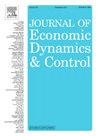Green technology investment: Announced vs. unannounced subsidy retraction
IF 2.3
3区 经济学
Q2 ECONOMICS
引用次数: 0
Abstract
Policy uncertainty affects firms' investment decisions and the corresponding societal welfare (total surplus). One common perception is that policy uncertainty has negative welfare effects, and therefore, the regulator should be “transparent” by announcing future policy changes. We show that this is not always true. This paper investigates a firm's green technology investment decision in a dynamic setting, where it decides about the investment timing and size in the presence of technological uncertainty. Initially the regulator incentivizes the investment by subsidizing. As the cost of the green technology is expected to fall over time, at some point the subsidy is retracted. We consider two scenarios, one where the regulator announces the subsidy retraction in advance, and one where it does not do so. The subsidy retraction announcement can motivate the firm to invest too early from a welfare perspective because it wants to catch the subsidy. This rent-seeking behavior implies that for an intermediate range of subsidy levels, not announcing the retraction leads to more favorable welfare consequences. We further show that a larger uncertainty about technological development encourages not to announce the subsidy retraction.
绿色技术投资:宣布与未宣布的补贴撤销
政策不确定性影响企业的投资决策和相应的社会福利(总剩余)。一种普遍的看法是,政策的不确定性对福利有负面影响,因此,监管机构应该通过宣布未来的政策变化来“透明”。我们证明这并不总是正确的。本文研究了动态环境下企业绿色技术投资决策,在技术不确定性存在的情况下,企业对投资时机和投资规模的决定。最初,监管机构通过补贴来激励投资。随着时间的推移,绿色技术的成本预计会下降,在某些时候,补贴会被收回。我们考虑了两种情况,一种是监管机构提前宣布补贴撤回,另一种是不这样做。从福利的角度来看,补贴撤销公告可能会促使企业过早投资,因为它想抓住补贴。这种寻租行为意味着,在补贴水平的中间范围内,不宣布取消补贴会带来更有利的福利结果。我们进一步表明,技术发展的较大不确定性鼓励不宣布补贴撤回。
本文章由计算机程序翻译,如有差异,请以英文原文为准。
求助全文
约1分钟内获得全文
求助全文
来源期刊

Journal of Economic Dynamics & Control
ECONOMICS-
CiteScore
3.10
自引率
10.50%
发文量
199
期刊介绍:
The journal provides an outlet for publication of research concerning all theoretical and empirical aspects of economic dynamics and control as well as the development and use of computational methods in economics and finance. Contributions regarding computational methods may include, but are not restricted to, artificial intelligence, databases, decision support systems, genetic algorithms, modelling languages, neural networks, numerical algorithms for optimization, control and equilibria, parallel computing and qualitative reasoning.
 求助内容:
求助内容: 应助结果提醒方式:
应助结果提醒方式:


